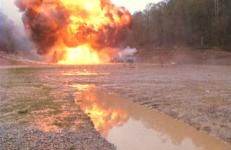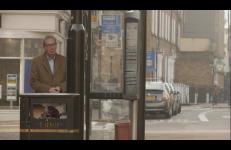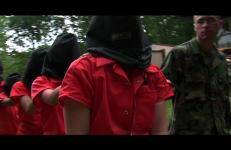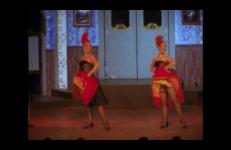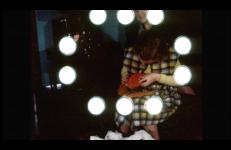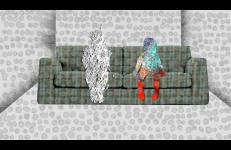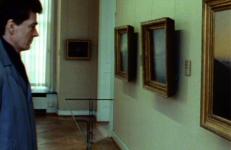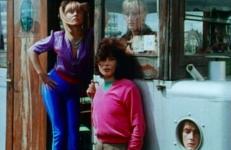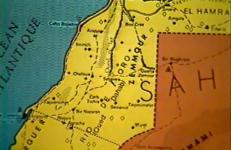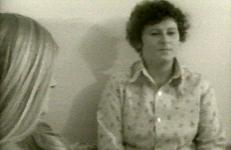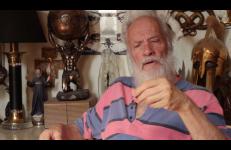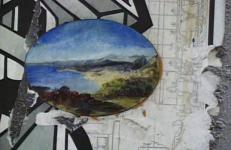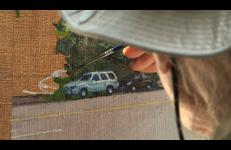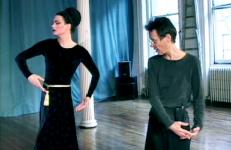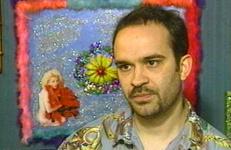A meditation on the milieu of elevated threat addressing national identity, gun culture, wilderness, consumption, patriotism and the possibility of personal transcendence. Of particular interest are the ways Americans have come to understand freedom and the increasingly technological reiterations of manifest destiny.
Documentary
A watchful dog in a confusion of reflected chairs begins and ends Cohen’s finely tuned observational portrait of London’s Essex Street, and the inhabitants who work the shops and throng the pavement there. People hurrying, pausing, waiting or simply standing, intermingled with worn statues of historic peerage in the slanted light of late afternoon. A man holds a copy of The Law of Privacy and the Media as though testing its resilience against the quiet onslaught of an average work day.
This documentary charts a trip around Baja California to the Tropic of Cancer line on the summer solstice. Largely photographed in-camera, the film develops its narrative drive through the rhythm of shot length and composition. Aided by an original score from Beth Custer and a wicked sound design by Jeremiah Moore that utilizes sounds form the Cassini space probe, the piece takes on a humorously sinister tone; as if the historical marker were an alien landing
Documentary of the New York experimental theater company The Wooster Group on tour in Glasgow, Scotland, 2000, installing their production of HOUSE/LIGHTS.
Operation Atropos is a documentary about interrogation and POW resistance training. Director Coco Fusco worked with retired U.S. Army interrogators who subjected her group of women students to immersive simulations of POW experiences in order to show them what hostile interrogations can be like and how members of the U.S. military are taught to resist them. The group of interrogators is called Team Delta, and they regularly offer intensive courses that they call "Authentic Military Experiences" to civilians.
The urge to relieve a winter valley of permanent shadow and find fortune in alluvial gravel are part of a long history of desire and extraction in the far Canadian north. Cancan dancers, curlers, ore smelters, former city officials and a curious cliff-side mirrored disc congregate to form a town portrait. Shot on location in Dawson City, Yukon Territory.
Memory in three acts. A boy opens his presents. Two men open a suitcase stuffed with photographs. An aging actress opens her heart to lost love and ancient rivalries.
Paternal Rites is a first-person essay film that examines the secret underbelly of a contemporary Jewish American family as they grapple with the aftereffects of physical and sexual abuse on their present-day lives. It is also a groundbreaking film about the nature of trauma and memory itself: the ways in which trauma encrypts in uncanny ways; the function of speech and narrative in the process of decryption; and the role of film and filmmaking in the practice of healing.
Pemp traces the 25-year struggle of the Parakatêjê (Gavião) to maintain autonomy in the face of huge development projects in the south of Pará. From the initial recovery of their lands in 1957 through dealings with FUNAI in the 1970s and the appropriation of Brazil nut monopolies to their current negotiations with the government, Pemp shows the Parakatêjê’s most precious project; the preservation of their ceremonies and songs. The Kokrenum, chief and keeper of the group’s traditions, uses video to transmit them to future generations.
Pemp traces the 25-year struggle of the Parakatêjê (Gavião) to maintain autonomy in the face of huge development projects in the south of Pará. From the initial recovery of their lands in 1957 through dealings with FUNAI in the 1970s and the appropriation of Brazil nut monopolies to their current negotiations with the government, Pemp shows the Parakatêjê’s most precious project; the preservation of their ceremonies and songs. The Kokrenum, chief and keeper of the group’s traditions, uses video to transmit them to future generations.
People enjoy my company connects the privatisation of telecommunications with techno-optimism, euphoria and online communication in the lead-up to the millennium.
The film explores the privatisation of the Irish state-owned telecommunications company Telecom Éireann from the viewpoint of shareholders communicating on early online forums. The event is contextualised within ideologies of technological emancipation in the pre-millennium period.
"Persistence was shot in 1991-92 in Berlin, and edited with films by U.S. Signal Corps cameramen in 1945-46, obtained from Department of Defense archives. Interspersed through these materials are filmic quotations from Rossellini's Germany Year Zero (1946). A meditation on the time just after a great historical event, about what is common to moments such as these—the continuous and discontinuous threads of history—and our attachment to cinematic modes of observation that, by necessity, shape our view of events.
Plowman's Lunch is called a documentary because its intent was to explore actual occurrences—be these the building of the work, or what befalls the players. It still uses an open form, but the characters are more developed; they have "names," and some of the scenes were truly dangerous for them to produce. As in the other films (with the exception of Done To) there is a nucleus of three characters—two women (Boris and Jamiee), and one man (Steentje, a tranvestite/hermaphrodite). The music, composed expressly for the piece, is harmonious with its developments.
A historical analysis of the on-going war in the Western Sahara. Liza Bear interviews Abdullah Majdid, the Polisario Front's United Nations representative. The tape addresses Morocco's U.S.-backed military effort to subjugate the indigenous Sahrawi population and annex one of the world's largest phosphate deposits, as well as the Sahrawis' conditions for a referendum.
The setting for The Politics of Intimacy recalls the widespread consciousness-raising (CR) groups in the late '60s and early '70s inspired by the emerging feminist movement. CR groups provided a forum to openly and collectively validate women's otherwise private experiences. In the tape Dr. Sherfy, one of the first doctors to write about female sexuality, and nine women of different ages, sexual preferences, and economic and social situations discuss their sexual experiences.
Primate Cinema: Apes as Family is a drama made expressly for chimpanzees – and the chimps' reaction to its screening at the Edinburgh Zoo. Chimpanzees watch television as a form of enrichment in captivity. But no filmmaker had made a film for a specifically ape audience.
Susan Mogul's first video diary work, produced two years before Everyday Echo Street: A Summer Diary (1993), follows the artist on a trip though Eastern Europe immediately after the fall of the USSR. Through discussions with various characters about politics, art, and each others personal lives, Mogul creates a video time capsule of social life in Poland, then Czechoslovakia, and former Yugoslavia.
Public Discourse is an in-depth study of illegal installation art. The primary focus is on the painting of street signs, advertising manipulation, metal welding, postering and guerrilla art, all performed illegally. Public Discourse is about passionate artists who want their work to be seen by a wide range of people rather than be confined to the systemic structures of galleries and museums.
Public Discourse is an in-depth study of illegal installation art. The primary focus is on the painting of street signs, advertising manipulation, metal welding, postering and guerrilla art, all performed illegally. Public Discourse is about passionate artists who want their work to be seen by a wide range of people rather than be confined to the systemic structures of galleries and museums.
Public Discourse is an in-depth study of illegal installation art. The primary focus is on the painting of street signs, advertising manipulation, metal welding, postering and guerrilla art, all performed illegally. Public Discourse is about passionate artists who want their work to be seen by a wide range of people rather than be confined to the systemic structures of galleries and museums.
Since the early 1970s, Rackstraw Downes has committed himself to painting from observation, on site, from start to finish. He has painted both urban and rural landscapes, as well as interior spaces, in New York, Texas, and Maine. Although he paints exactly what he sees, through his labor ordinary sites become transformed into extraordinary scenes.
"In the spring of 2002 I handed over to Charles Atlas a collection of films and videotapes in various formats that I had been accumulating with an eye to his editing them into what I call a "faux Rainer portrait" (though he may well call the final product something else).
A daily chronicle of the Ashaninka community during the rainy season, recorded on video during a workshop in a village on the Amônia River in the state of Acre. The involvement of the filmmakers with the Ashaninka community makes the film go beyond a mere description of activities, reflecting the rhythm of the village and the humor of its inhabitants.
Direction and photography by Valdete, Isaac, and Tsirotsi Ashaninka, Llullu Manchineri, Maru Kaxinawá, Nelson Kulina, Fernando Katuquina, and André Kanamari; edited by Mari Corrêa.
In Ashaninka with English subtitles.
Ray Lowden keeps seventy-two large birds of prey, five deer and some wallabies at his place in Northumberland, England. He’s had ten days off in twelve years and loves what he does. The film is a little homage to his variously coy, imperious, curious, stubborn and comic raptor menagerie.
-- Deborah Stratman
This short piece introduces the visual artist German Bobe. A narrator explains Bobe’s background in various media, stressing that his work—the media he chooses and the themes he revisits—presents a synthesis of the concerns of his generation.
In Spanish.




